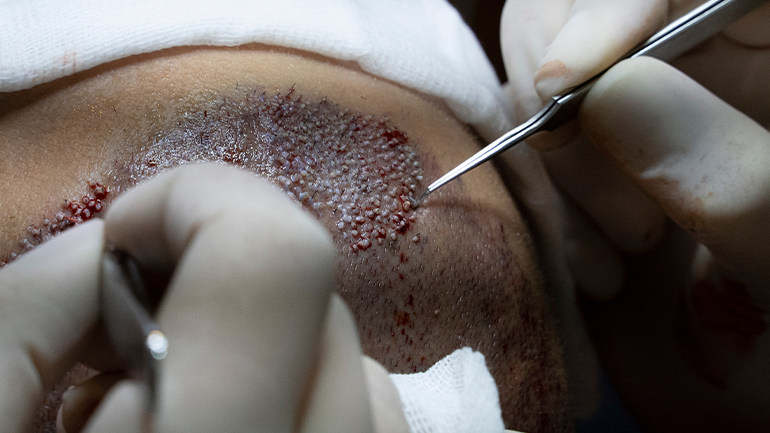Shock Loss After Hair Transplant
Shock loss is a term used to describe the temporary waste of hair that can occur after a transplant procedure. This condition is also known as shedding.
It is a natural part of the hair transplant process and is not cause for concern. It typically occurs within the first few weeks after the procedure, and can affect both the transplanted hair and the surrounding non-operated site. In this article, we’ll take a closer look at shock loss, including what it is, how it occurs, and what you can do to minimize its effects.
The cause of shock loss is not completely understood, but it is thought to be related to the stress that the hair follicles undergo during the operation. When they are transplanted from one area of the scalp to another, they are subjected to trauma and may go into a resting phase as a result. This can cause the hair to shed temporarily.
It’s important to note that shedding is not the same as permanent hair loss. It is only temporary, and the hair will typically grow back within a few months. In most cases, the hair that is lost during the shock loss phase will be replaced by thicker, healthier ones once it starts to regrow. As CLINIQUEPLUS, we offer you the whole experience we have in hair transplantation with our expert staff.
Who is at Risk For Shock Loss?
Anyone who undergoes a hair transplant procedure is at risk for shock loss. As we mentioned in the introduction of our article, this is an ordinary stage of the procedure. However, there are certain factors that may increase your risk of shedding, including:
- A History of Hair Loss: If you have a history of it, you may be more likely to experience shedding after a hair transplant procedure.
- A Large Number of Grafts: The more grafts that are transplanted, the higher your risk of shock loss may be.
- A Tight Scalp: If you have strict one, it may be more difficult for the transplanted hair to take hold, which could increase your risk of shedding.
- Certain Medications: Some drugs, such as blood thinners, may increase the risk.
How Can You Minimize the Effects of Shock Loss?
While shock loss is a normal part of the hair transplant process, there are a few things you can do to minimize its effects. These include:
- Avoiding Heavy Exercise: Strenuous practices can increase blood flow to the scalp, which can exacerbate shock loss. It’s best to avoid them for at least a few weeks after your hair transplant procedure.
- Using Gentle Hair Care Products : Prefer right staff that are formulated for sensitive scalps. Avoid using harsh shampoos and styling products, as these can irritate the scalp and worsen shock loss.
- Using a Scalp Protector : A scalp protector can help to reduce the risk of shock loss by protecting the transplanted hair follicles from trauma.
- Taking Care of Your Scalp : Keep it clean and moisturized to promote healthy hair growth. Avoid using hot water when washing your hair, and be sure to use a wide-toothed comb to gently detangle it.
- Managing Your Stress : It can exacerbate shock loss, so it’s important to manage your stress levels during the recovery period. Consider practicing relaxation techniques, such as meditation or yoga, to help reduce it.
When Will Your Hair Grow Back After Shock Loss?
The rate at which your hair will grow back after shock loss varies from person to person. In general, you can expect your hair to start growing back within a few months after the procedure. It may take 6 to 10 months for your hair to fully grow back, and it may be several months before you see the full effects of the operation.
It’s important to be patient during this process and to follow your doctor’s instructions for post-procedure care. This will help to ensure that your hair grows back as strong and healthy as possible. If you have any concerns about the rate at which your hair is growing back, be sure to speak with your doctor. They can assess your progress and provide guidance on what you can do to help your hair grow back as smoothly as possible.
If you want to learn more about hair transplant in Turkey and plan your treatment as soon as possible, you can get a free consultation from CLINIQUEPLUS. Please contact us.



